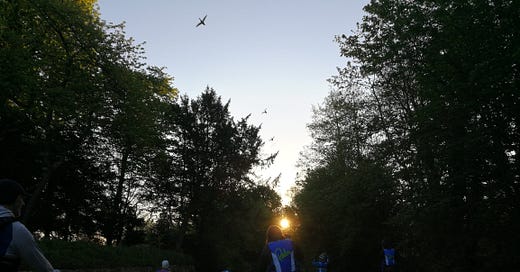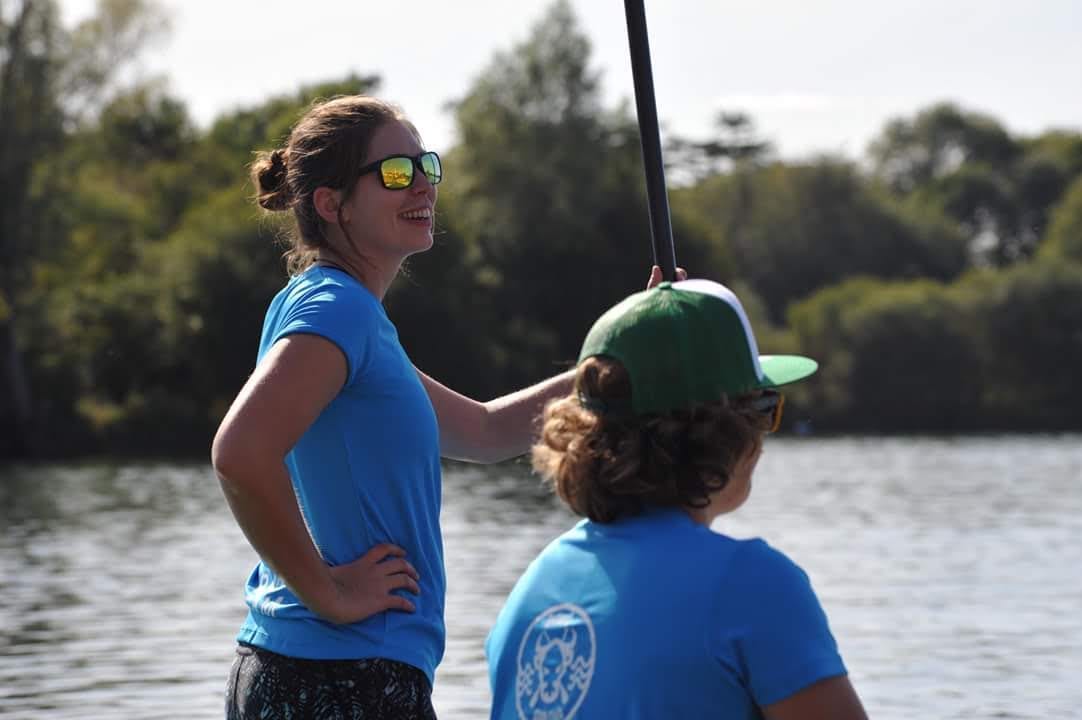
Urban SUP: Paddling to find nature in a city
Kat Young shares the joy of stand up paddleboarding adventures in her home city
I’ve lived in a city for the last ten years and have been paddleboarding in it for the last five. I love how flexible paddleboarding can be. It can be a social activity, an after-work stress-down, an athletic pursuit at races and competitions, a meditative meander... For me, it summons refrains of Pocahontas’ “Just around the river bend”.
Problematic historical romanticism aside, I always find myself craning my neck to see what’s coming up around the next bend in the river, like some kind of urban adventurer. Even if it’s part of a river that I’ve paddled before, there’s something different every time that feeds my inner explorer. The rivers are in constant flux depending on the weather and the seasons - and each month I declare that it is my favourite month on the water. Except maybe February.
A Year of City Nature
In winter it can be dramatic. In March when the river was amber-flagged, so only experienced paddlers were out, it was a battle to make progress upstream against the torrent. Water levels were high and tree branches were newly fallen, redesigning the sub-surface landscape. Adding new obstacles that we needed to avoid catching our fins on, so we didn’t tumble into the water. I am yet to fall off my board and had no intention of that being the first occasion.
The geese were hunkered down on the banks and the swans stared disdainfully at our foolish escapades. We crouched under low branches, and lay flat, pulling ourselves along hand-over-hand to get through even lower branches. My board was covered in a rorschach arrangement of blossom and willow tree leaves and my hair was speckled with twigs. When it came to turning around to paddle back to our launch site it was only necessary to steer as the current carried us all the way down.
In summer it can be serene. With calm waters and no wind, there’s a small joy in taking care to silently move your paddle through the water, gliding softly forward. The river near-perfectly reflects the sky and it’s only the rippling bow wave of your board that breaks the illusion. It takes little energy to paddle slowly and after rushing around the city in the day it feels indulgent to slow your pace down to the speed of the water.
You feel as if you’re not just observing the wildlife and ecosystems, but that you’re a part of them. Seeing the flash of blue of a kingfisher dart along just above the river, hearing the coos of a moorhen corralling its chicks, and glimpsing an otter dive into the reeds feels like another world from the hustle and bustle of the city. That connection with wildlife in a city is something that I value a lot, having grown up in a small village in the countryside. It can be easy to think that cities are barren concrete street scenes, but the perspective you get from standing on a paddleboard, and the places you can reach, offer a different view. I kayak from time to time but the extra height on a paddleboard really opens up the experience.
Connected by Waterways
Paddling along rivers and canals connects me not only to the nature around me, but to our history on the water. The Thames meanders east, through London and into the sea. It’s the same route that boats transported cargo and people hundreds of years ago - and it’s the same water that my father is sailing on in the Channel. The river was here before me and will continue flowing after I’m gone. The paradoxical nature of being ever-changing but perennial brings me comfort when society is going through a massive upheaval.
The paradoxical nature of being ever-changing but perennial brings me comfort when society is going through a massive upheaval.
One weekend I traversed the length of my city by water, starting among fields of wheat, paddling south as urban sprawl grew up around me, under ring roads and railway bridges, through secluded green corridors in the middle of town, past churches, pubs and boathouses, continuing south as urban sprawl dissipated behind me. Travelling silently through the rise and fall of civilisation is a very grandiose way of describing my water-borne adventures, but it’s hard to not appreciate the workings of nature on a scale larger than ourselves whilst moving in such a manner.
Paddleboarding has also changed my opinion on the environmental impacts of cities. I’m an environmental consultant by day and there’s a prevailing view of “cities bad; rural good”. Some of the UK’s aquatic wildlife, such as otters, are very particular about the quality of their water. It’s only in the last couple of years that I’ve seen them around the river in town, hinting at improvements to local water pollution. One SUP club session we participated in a nationwide ‘Plastic Patrol’ - collecting any rubbish we find in the water on our boards to dispose of it properly. Over a couple of hours I found fewer than a dozen items. Obviously the ideal outcome would be to find no rubbish, but compared to groups in other towns, our haul was rather small.
Novice SUP Clubs
To feed my competitive nature more directly, one year my SUP club captain entered me into the women’s novice national club championships, along with other club members. My default speed is cruising, but I still found myself eyeing up the competition before the start. There were many different categories racing at the same time which made it hard to keep track of your position in your race whilst on the water, so I just tried to paddle as fast as I could maintain over the 5km course.
The elite racers paddle on very narrow and long boards - I tried one once and nearly fell in straight away, it was so unstable. I raced on a board borrowed from the club that was narrower than my usual, but didn’t feel like it was going to throw me overboard immediately. My captain says he can tell who has a regular yoga practice by how wobbly they are on the board. SUP is basically tadasana on water. I finished the day with a trophy from one race and a wooden spoon from another. I was definitely outside my comfort zone but the other women racers were so welcoming and just happy for everyone doing their best, that it didn’t matter what board you were on or how recently you’d picked up a paddle.
That community on the water is something to be treasured and nourished. Branching out into community engagement, the club started crewing at local swim-run races on the Thames, providing support for the swimming sections for the racers. I am a reluctant swimmer at the best of times and am always in awe of those who voluntarily exert themselves when you can’t breathe in for half of the time. Our role was to keep the swimmers on track, steer them away from the banks at bends in the river, provide a refuge in case anyone got into trouble and defend them from swans. That last part wasn’t in the briefing, but turned out to be necessary.
Paddleboarding is a great leveller of social backgrounds. Friends that I’ve made through my club include a policewoman, a builder, a yoga instructor, a management consultant, a fireman, an economics professor, and an Adventurer with a capital A. Some have their own boards, some borrow from the club. All have smiles on their faces when on the water. SUP has a very low bar for athletic ability, but if competition is your thing then there are numerous local racing leagues across the summer to test your paddling skills (and maybe win some cake).
Pre-work Adventures
Paddling at night brings a new layer to the urban adventure, for me at least. I am a grown woman unashamedly scared of the dark, with added thalassophobia (fear of deep bodies of water and what lurks beneath the surface). Admittedly it wasn’t pitch black, and the river is not bottomless. But when I launched onto the river at 5am one Wednesday morning my heart was beating more from adrenaline than exertion. I was the first of my friends on the water and I cast the beam of my head torch around me, watching for some kind of river monster to emerge from the Cherwell. My breath clouded in front of me and the frost on my board sparkled in the head torch light. Obviously, no behemoth emerged and instead I got to watch the river life go through their morning routines backlit by the sunrise and listen to the dawn chorus, before heading off to the office.
Five years ago our midweek evening meanders would draw quizzical looks from passers-by, but SUP has become much more of a recognised activity, if not quite mainstream. Coming out of lockdowns it’s a perfect socially-distant activity, and one that might open up exploration, mini-adventures and a new perspective of your home town.
Kat Young paddles with Oxford SUP Club and can generally be found planning her next human-powered adventure on land or water. You can read more of her stories at attitude-over-ability.com or on Twitter @KEYoung29.








